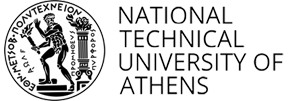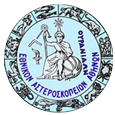Hellenic Center for Marine Research (HCMR)
(url: https://www.hcmr.gr )
The Hellenic Center for Marine research is a governmental research organization operating under the supervision of the General Secretariat for Research and Technology (GSRT) of the Ministry of Education, Research and Religious Affairs. The HCMR is in Anavissos, Attikis comprises three Research Institutes, (a) the Institute of Marine Biology, Biotechnology and Aquaculture (IMBBC), (b) the Institute of Marine Biological Resources and Inland Waters (IMBRIW) and (c) the Institute of Oceanography (IO).
It aims to carry out scientific and technological research, and experimental development, dissemination and implementation of produced results, especially in the fields of study and protection of the hydrosphere, its organisms, and its interface with the atmosphere, the coast and the sea bottom, the physical, chemical, biological and geological conditions that prevail and regulate the above-mentioned systems:
(a) The production of products and supply of services,
(b) The support of decision-making concerning the general public, the economy and culture and
(c) Their economical exploitation either by the HCMR and/or by its employees or by third parties.
- Institute of Oceanography, HCMR
(url: http://poseidon.hcmr.gr )
The overall scientific mission of the Institute of Oceanography (IO) is the mulltidisciplinary study and the long term monitoring of the physical, chemical, biological and geological processes that govern the structure, functioning and evolution of pelagic and benthic ecosystems. The interaction of the hydrosphere with their physical boundaries, the atmosphere, the coastal zone, the seabed and the related geodynamic processes and hazards. The operational long-term monitoring and forecasting of the marine environment. The study of the dynamics of water masses, the climatic variations, the biogeochemical cycles, the food webs, the biodiversity and their interaction. It explores the marine and underwater energy resources and geo-hazards, the anthropogenic impact on the marine environment and implements integrated coastal zone management actions. It is active in the fields of operational oceanography, marine renewable energy and underwater geo-archaeology. Organizes and manages integrated marine observatories and develops marine technology. The individual activities of the IO Research, the production of "useful" knowledge in the context of "blue growth" technology, training and, at the social level, information-awareness-education. IO blue growth goals, include the involvement in research applications, the training and education, the support of decision-making, the development and exploitation of the scientific -technological products and the provision of marine and maritime services.
- Institute of Marine Biological Resources and Inland Waters (IMBRIW), HCMR
(url: https://imbriw.hcmr.gr )
The Institute of Marine Biological Resources and Inland Waters (IMBRIW) is focusing on the activities of fisheries and Inland Waters research. The IMBRIW is leading public research institution in Greece, with a key role in the Mediterranean region and the EU. The main goals of IMBRIW are the production of knowledge related to structural and functional aspects of inland aquatic ecosystems and the high trophic level components (including fisheries) of marine ecosystems, and the application of this knowledge for integrated river basin and coastal zone management, ecosystem approach to fisheries and biodiversity conservation.
National Technical University of Athens, NTUA
(url: https://www.ntua.gr )
Founded in 1837, almost along with the modern Greek state, NTUA is the oldest Technical University in Greece. Initially established by a royal decree "on architectural education" it was a technical school operating on Sundays and holidays which offered instruction to those desiring to master in architecture. Though, at a remote location it soon attracted many students. Its popularity lead to the extension of courses and by spring 1840 to the operation of a regular day school along with the Sundays counterpart. It was then moved to its own building on Piraeus street. The joint efforts of students and instructors contributed to a continuous growth and to revising standards.
The school quickly introduced reforms to make it better able to respond to the domestic needs of reconstruction and industrial development. Studies reached the three years, enriched with new disciplines, and the administration was taken over by the Committee for the Encouragement of National Industry.
After the introduction of a four-year degree course for civil and mechanical engineering, in 1887, the NTUA was able to announce that it "educates high level engineers for the public service, industry and construction" as competent as "graduates from the well–known engineering schools of Western Europe". The final major reform of the organisation and administration of NTUA took place in 1917. The "Ethnicon M etsovion Politechnion" acquired five high level engineering schools: Civil, M echanical & Electrical, Architecture, Chemical and Surveying. Many subsequent changes since 1917, have led to its current form: a prestigious University of Science and Technology, with eight Engineering Schools and a ninth School of Applied Mathematical and Physical Sciences.
- School of Civil Engineering, NTUA
-
(url: http://www.civil.ntua.gr )
The School of Civil Engineering of the National Technical University of Athens, the oldest engineering school in the country and alma mater to all other engineering Schools, has played a protagonist role in the scientific, technical and economic development of the country during its many years of operation. Since the 19th century, in turbulent or tranquil periods in recent Greek history, the School’s graduates have been a solid reference and bedrock of the construction and reconstruction of the country and its infrastructures. The School's graduates are not limited by the borders of the country and often leave their mark on world scientific and technological developments. Teaching staff and students are actively involved in the global production of new knowledge. As a result of the great quality of work by professors, undergraduate and postgraduate students, in recent years, the School finds itself highly positioned in International School rankings - for example, eighth amongst European Civil Engineering Schools according to QS organization. - School of Naval Engineering, NTUA
-
(url: http://www.naval.ntua.gr/ )
University of Aegean
(url: https://www.aegean.gr )
The University of the Aegean (UAegean) was founded in 1984 aiming to introduce new approaches in higher education in Greece and worldwide and to promote regional development. Situated in 6 picturesque islands in the Aegean Archipelago, the UAegean offers a unique natural, cultural and human environment for modern studies in the ancient cradle of knowledge.
In less than thirty years, the UAegean has evolved into an international research –oriented University offering 18 undergraduate (BA or BSc) and 40 postgraduate (MA or MSc) programmes in modern interdisciplinary thematic areas such as environment, communication systems, cultural informatics, product design, food and nutritional sciences, education design and Mediterranean studies. In addition, the UAegean has established joined international postgraduate programs (i.e. in Biodiversity, Environmental Policy and Management, European Integration) as well as joined PhD degree programmes in a wide range of thematic areas.
The UAegean has created a strong international academic and research profile, having been an active member of the European Universities Association (EUA), a founding partner of the Cremo network, member of the EMUNI Senate, partner in many academic and research networks and participant in more than 210 bilateral and LLP Erasmus academic agreements.
- Department of Oceanography and Marine Biosciences
-
(url: https://www.mar.aegean.gr )
Situated at the eastern part of the Aegean arhipelago, the Department of Oceanography and Marine Biosciences is the only university department in Greece that offers Bachelor, Master and Ph.D. degrees in Oceanography, conducting applied science of economic relevance, and public awareness of the marine environment. DOMB stands at the forefront of marine research through observation, theory, modelling and technological innovation, as well as international collaborations with leading marine research institutes.
National and Kapodistrian University of Athens, NKUA
(url: https://www.uoa.gr )
The University of Athens, inaugurated on 3rd May 1837, was first housed in a neoclassical residence, on the northeastern side of the Acropolis, renovated today and operating as the University Museum. Initially named "Othonian University" after Greece's first King, Othon, it consisted of 4 academic units and 52 students. As it was the first university in the newly established modern Greek state, as well as in the Balkans and the Eastern Meditarranean region, its socio-historically significant role has been decisive for the production of particular knowledge and culture in the country.
Still perhaps the most prestigious university in the country, the University of Athens has established a tradition in scholarship and constructive participation in the social sphere
- Laboratory of Environmental Chemistry, Chemistry Department, NKUA
-
(url: http://www.chem.uoa.gr)
The research group of Environmental Chemistry of the National and Kapodistrian University of Athens was created by Michael Scoullos in the mid 1970s and has constituted part of the Inorganic and Environmental Chemistry and Technology Division of the Chemistry Department since 1982. Michael Scoullos was also a founding member of the first Greek post-graduate course on Ocean Studies established in the University of Athens in 1974. The independent Laboratory of Environmental Chemistry was founded in 2003. In 2011 the UNESCO Chair and Network on Management and Education for Sustainable Development in the Mediterranean was situated in the Laboratory of Environmental Chemistry.The perspective of the Laboratory includes an integrated and holistic approach of the environment, which has contributed to its very high reputation and the efficient handling of a large number of various types of competitive programs and projects of nearly all aspects of environmental science, technology, management and education. The Laboratory of Environmental Chemistry is accredited according to ISO/EN 17025.
Its research activity and programs are related to the following major directions:
- Chemistry of aquatic systems with emphasis on the marine environment, including surface and ground waters, marine surface microlayer and sediments: circulation, chemical behavior, impact on ecosystems and distribution of metals, nutrients and organic pollutants, qualitative characteristics.
- Study of natural systems of particular interest (microenvironments), such as river estuaries, wetlands, lagoons etc, investigation of coastal eutrophication and its impact.
- Study of biogeochemical cycles and metal speciation, nutrients and other substances in aquatic systems.
- Environmental impact of anthropogenic activities in the natural environment, phenomena of marine pollution with emphasis on coastal systems.
- Ecotoxicological studies in aquatic ecosystems, bioaccumulation studies in various marine organisms – bioindicators and study of the impact of chemical compounds on the food chain.
- Study of metal speciation in natural systems and foodstuffs, which is responsible for their biological activity and impact. Toxicological study of trace elements in biological fluids.
- Chemistry of the atmospheric environment and indoor spaces, determination of various pollutants in aerosols.
- Magnetic properties of particulate matter and sediments.
- Applications of environmental geochemistry with emphasis on magnetic characterization, behavior and distribution of principal elements and trace metals in soil systems.
- Study of interactions in the system rock – water with emphasis on chromium speciation.
- Environmental management of aquatic and marine ecosystems (use and exploitation of research results), contribution to the establishment of environmental policy and legislation.
- Environmental education with emphasis on sustainable development.
ΟResearch activities of LEC are carried out in the framework of environmental programs at both national and international levels. Progress elaborated is characteristically reflected in LEC-NKUA statistics: the numbers of PhDs (>50), MScs (>280), peer-reviewed research publications (>250), University publications/books (23), environmental education publications (>100), monographs/books (>25), publications in conference proceedings (>400) etc, produced since the beginning of LEC-NKUA research activity. Particularly significant is the contribution of the cooperations, in which the laboratory participates, with several local and international institutes. Through these collaborations effective transfer of know-how is achieved.
Harokopio University of Atehns
(url: https://www.hua.gr)
Harokopio University of Athens is a public university dedicated to promoting research and learning in a small, well focused set of intellectual areas. The university, situated in the centre of Athens and close to the Unesco World Heritage Centre of the Acropolis, originates from an educational institution that was first established in 1929 and gained the status of University in 1990. It takes its name from the national benefactor Panagis Harokopos.
The University’s excellent campus facilities houses four academic departments, the central administration, the library, the IT centre and student advisory services.
- Department of Geography
(url: https://www.geo.hua.gr )
The department of Geography at Harokopio University of Athens was founded in 1999 and welcomed its first class students during the academic year 2000-2001. It is one of the two Hellenic university departments dedicated to Geography, a dynamic scientific field at the intersection of physical and social sciences.
The mission of the Department of Geography consists in (i) promoting of the science of Geography, (ii) providing high-quality education, at undergraduate and post-graduate level, combining scientific ethos and theories of the Geographic science with the understanding of the problems the society faces, its demands, its needs, (iii) developing basic and applied research in the fields covered by Geography at international level, (iv) assuring the appropriate academic environment so that students, researchers and staff members may deploy at their best their capabilities.
National Observatory of Athens
(url: http://www.noa.gr )
The National Observatory of Athens (ΝΟΑ), the oldest research center of Greece, was founded by a Royal Decree of 1840, after a donation by the national benefactor Georgios Sinas. The public character of NOA exists since 1846, when it was established on Lofos Nymphon (Hill of the Nymphs) in Thisseion, opposite of the Acropolis, where it has been headquartered ever since.
NOA is a Research Centre supervised by the General Secretariat for Research and Technology of the Ministry of Education, Research and Religious Affairs. Important objectives of NOA are to conduct original research and to exploit research results for the benefit of the Greek society and economy.
NOA comprises three Institutes:
- The Institute for Astronomy, Astrophysics, Space Applications and Remote Sensing is active in the thematic areas of Astronomy and Astrophysics, Earth Observation and Monitoring by Satellite and Terrestrial Remote Sensing and Signal and Image Processing.
- The Institute for Environmental Research & Sustainable Development covers a wide research area including the Atmospheric Environment, Climate and Climate Change, Meteorology, Hydrology and Energy, with sustainability as cross-cutting theme.
- The Institute for Geodynamics is responsible for monitoring the seismicity in the wider Greek area. The fields of scientific activity of GI are Seismology, Physics of the Inner Earth, Tectonics, Volcanology and Geothermal Energy, Seismotectonics and Technical Seismology.
- Institute for Environmental Research & Sustainable Development
-
(url: http://www.meteo.noa.gr/)
IERSD studies and addresses most environmental issues (except those related to the marine environment). Its main directions/activities cover the topics of Meteorology - Climatology - Climate Change, Atmospheric Physics and Chemistry (Air Quality), Hydrology (surface and ground water) and Water Resources Management, Solar and Wind Energy, Energy Planning, Natural Resources Management, and in general, the impact of development on the environment.The Hydrological research at IERSD concerns the science and engineering of surface and subsurface water resources –hydraulics, hydrology, mass transport and resource management– developing and applying analytical and numerical models, as well as state-of-the-art hydrometric techniques. In surface hydrology, interest is on developing a tele-hydrometric network (priority sites), to enhance civil protection and provide data for the design of hydraulic works, via flow monitoring. In groundwater hydrology, the research focuses on the sustainable management of coastal aquifers under changing pressures: climate change –including sea level rise and aquifer recharge reduction– and increased abstractions.
University of Ioannina
(url: https://www.uoi.gr/)
In 1962, a Central Committee for the Foundation of a University in Ioannina was established in Athens. Its sole purpose was to effectively assert and broadly promote the Epirots’ fair request for the foundation of a third University or independent post-educational theoretical or technical schools in Ioannina. In one of its proclamations in July 1962, the Committee called on every official and unofficial authority, and every Epirot citizen, to take action for the realization of the above request.
The Centre of Research & Technology was founded in 2007 and consists of four Research Institutes:
- Institute of Research on Bioactive Natural Chemicals.
- Institute of Water Resources Management & Protection.
- Institute of Surface Technology.
- Institute of Educational Innovation.
Over the last years, due to the establishment of new Departments, the University of Ioannina has almost doubled its size, and its growth potential looks very promising. This will probably have a positive impact both on the academic community and the region as a whole.
- Department of Agriculture Technology
-
(url: http://tegeo.teiep.gr )
The Department of Agricultural Technology of the Technological Education Institute of Epirus (TEI of Epirus), offers highest level academic, research and development services regarding crop science, animal science and floriculture – landscape architecture.
Institute of Communication and Computer Systems (ICCS)
(url: https://www.iccs.gr)
Institute of Communication and Computer Systems (ICCS) was established in 1989 by the Ministry for Education, Lifelong Learning and Religion Affairs. It is a non-profit, private legal entity, which is linked to the National Technical University of Athens (NTUA) and is the research host of the School of Electrical and Computer Engineering (ECE). The aim of the Institute is to promote the Research and Development in all different research disciplines of SECE. The research themes mainly include Hardware and Software Technology, Computer Network Technology, Mobile technologies, Digital Communications Technologies, Control and Automation Technologies, Energy and Power Production Technologies, Biomedical and Biomechanics Technologies, Information Systems and Management Decision Technologies, Photonic Technologies for Communications.
ICCS is very active in programmes financed by the European Commission with substantial participation in competitive research programs. For example, the last five years it has participated in 110 projects of 6th Framework Program and in about 75 projects of 7th Framework Program.
In addition, ICCS was or is the co-ordinator of projects for several European programmes (eg EC, ISIS, RACE II, ESPRIT, IES, ACTS, INFOSEC, BRITE-EURAM, STRIDE, MIP-Informatics, Telematic Applications, GROWTH, QoL, JOULE, ENERGIE ) and parallel to this it participates in various Greek programmes.








